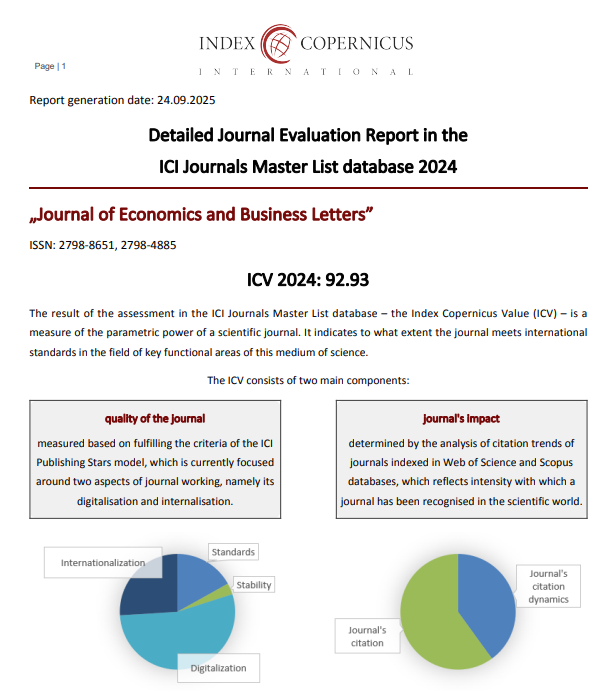The dynamic economic landscape of Bengkulu: A comprehensive analysis and its implications for sustainable growth across sectors
DOI:
https://doi.org/10.55942/jebl.v3i6.261Keywords:
Bengkulu Economy, Sectoral Contribution, Employment Trends, Economic GrowthAbstract
This research presents a comprehensive examination of the economic climate of Bengkulu, a province on the southwest coast of Sumatra, Indonesia. Utilizing a mixed-methods approach, this study combined qualitative and quantitative data collected from a purposive sample of 135 participants, including local business owners, government officials, economic analysts, and residents. This study investigates various economic indicators such as income levels, employment statistics, and sectoral contributions to the regional economy. Employing a hypothetical regression analysis, this study explores the connections between sectoral contributions, employment rates, growth rates, and consumer spending in key sectors such as agriculture, services, mining, and retail and their impact on regional Gross Domestic Product (GDP) growth. The findings reveal a dynamic economic landscape with significant growth observed in certain sectors while also highlighting challenges such as economic inequality and the need for diversified economic strategies. This study not only offers insights into the current economic status and trends in Bengkulu, but also provides critical information for policy-making and strategic planning aimed at promoting sustainable and inclusive economic growth in the region.
References
Baxter, P., & Jack, S. (2008). Qualitative case study methodology: Study design and implementation for novice researchers. The Qualitative Report, 13(4), 544–559.
Burns, R. P., & Burns, R. (2008). Business research methods and statistics using SPSS. Sage.
Dutta, S., Narasimhan, O., & Rajiv, S. (2005). Conceptualizing and measuring capabilities: Methodology and empirical application. Strategic Management Journal, 26(3), 277–285.
Fahlevi, M. (2023). A Systematic Literature Review on Marine Tourism in Business Management: State of the Art and Future Research Agenda. Journal of Tourism and Services, 14(27), 299–321. https://doi.org/10.29036/jots.v14i27.549
Gaskin, J. (2013). Post-hoc power analysis in SmartPLS and AMOS. Gaskination’s Statistics.
Glaser, B. G., & Strauss, A. L. (2017). Discovery of grounded theory: Strategies for qualitative research. Routledge.
Habiburrahman, Prasetyo, A., Raharjo, T. W., Rinawati, H. S., Trisnani, Eko, B. R., Wahyudiyono, Wulandari, S. N., Fahlevi, M., Aljuaid, M., & Heidler, P. (2022). Determination of Critical Factors for Success in Business Incubators and Startups in East Java. Sustainability (Switzerland), 14(21). Scopus. https://doi.org/10.3390/su142114243
Hill, H., & Vidyattama, Y. (2016). Regional development dynamics in Indonesia before and after the ‘Big Bang’decentralization. The Singapore Economic Review, 61(02), 1640027.
Lind, D. A., Marchal, W. G., & Wathen, S. A. (2018). Statistical Techniques in Business & Economics (17th ed., p. 897). McGraw Hill Education.
Marhaeni, A., Yasa, I., & Fahlevi, M. (2022). Gender and age in the language of social media: An easier way to build credibility. International Journal of Data and Network Science, 6(1), 209–216. https://doi.org/10.5267/j.ijdns.2021.9.007
Nayak, J. K., & Singh, P. (2021). Fundamentals of research methodology problems and prospects. SSDN Publishers & Distributors.
Prabakusuma, A. S., Wardono, B., Fahlevi, M., Zulham, A., Djoko Sunarno, M. T., Syukur, M., Aljuaid, M., Saniuk, S., Apriliani, T., & Pramoda, R. (2023). A bibliometric approach to understanding the recent development of self-sufficient fish feed production utilizing agri-food wastes and by-products towards sustainable aquaculture. Heliyon, 9(7), e17573. https://doi.org/10.1016/j.heliyon.2023.e17573
Prasetyo, A., Gartika, D., Hartopo, A., Harwijayanti, B. P., Sukamsi, S., & Fahlevi, M. (2022). Capacity Development of Local Service Organizations Through Regional Innovation in Papua, Indonesia After the COVID-19 Pandemic. Frontiers in Psychology, 13(912692), 1–8. https://doi.org/10.3389/fpsyg.2022.912692
Prasetyo, A., Putri Harwijayanti, B., Ikhwan, M. N., Lukluil Maknun, M., & Fahlevi, M. (2022). Interaction of Internal and External Organizations in Encouraging Community Innovation. Frontiers in Psychology, 13(903650), 1–9. https://doi.org/10.3389/fpsyg.2022.903650
Sahabuddin, M., Sakib, M. N., Rahman, M. M., Jibir, A., Fahlevi, M., Aljuaid, M., & Grabowska, S. (2023). The Evolution of FinTech in Scientific Research: A Bibliometric Analysis. Sustainability (Switzerland), 15(9). Scopus. https://doi.org/10.3390/su15097176
Saunders, M., Lewis, P., & Thornhill, A. (2009). Research Methods for Business Students (5th ed.). Prentice Hall.
Sekaran, U., & Bougie, R. (2016). Research methods for business: A skill building approach. John Wiley & Sons.
Touwen, L. J. (2021). Extremes in the archipelago: Trade and economic development in the outer islands of Indonesia, 1900-1942 (Vol. 190). Brill.
Downloads
Published
How to Cite
Issue
Section
License
Copyright (c) 2023 Journal of Economics and Business Letters

This work is licensed under a Creative Commons Attribution 4.0 International License.
















